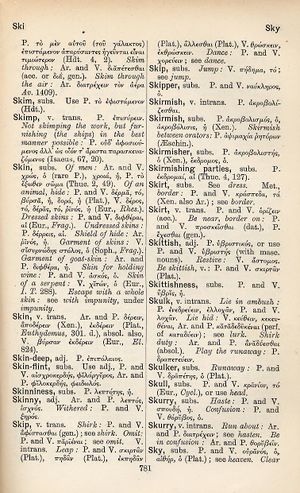skulk: Difference between revisions
From LSJ
ἆρά γε λόγον ἔχει δυοῖν ἀρχαῖν, ὑλικῆς τε καὶ δραστικῆς → does it in fact have the function of two principles, the material and the active?
(CSV5) |
m (Woodhouse1 replacement) |
||
| Line 1: | Line 1: | ||
{{Woodhouse1 | {{Woodhouse1 | ||
|Text=[[File:woodhouse_781.jpg|thumb|link={{filepath:woodhouse_781.jpg}}]] | |Text=[[File:woodhouse_781.jpg|thumb|link={{filepath:woodhouse_781.jpg}}]] | ||
===verb intransitive=== | |||
[[lie in ambush]]: [[prose|P.]] [[ἐνεδρεύειν]], [[ἐλλοχᾶν]], [[prose|P.]] and [[verse|V.]] [[λοχᾶν]]. | |||
[[lie hid]]: [[verse|V.]] [[κεύθειν]], [[κεκευθέναι]], [[Aristophanes|Ar.]] and [[prose|P.]] [[καταδεδυκέναι]] (perf. of [[καταδύειν]]); see [[lurk]]. | |||
[[shirk duty]]: [[Aristophanes|Ar.]] and [[prose|P.]] [[ἀναδύεσθαι]] (absol.). | |||
[[play the runaway]]: [[prose|P.]] [[δραπετεύειν]]. | |||
}} | }} | ||
Revision as of 08:54, 20 May 2020
English > Greek (Woodhouse)
verb intransitive
lie in ambush: P. ἐνεδρεύειν, ἐλλοχᾶν, P. and V. λοχᾶν.
lie hid: V. κεύθειν, κεκευθέναι, Ar. and P. καταδεδυκέναι (perf. of καταδύειν); see lurk.
shirk duty: Ar. and P. ἀναδύεσθαι (absol.).

